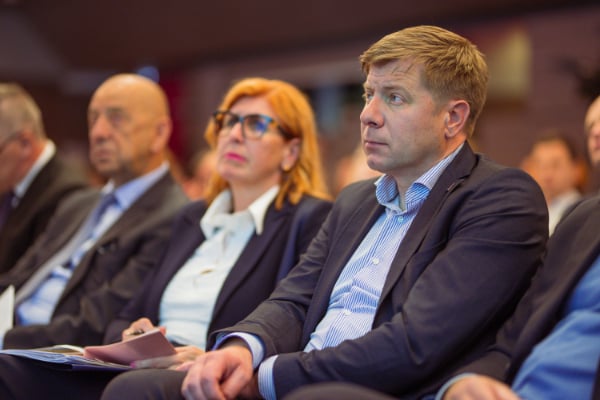“Things are starting to look very grim,” said Marko Drobnič, President of the Management Board of the company Talum, at a roundtable of businessmen and experts. Slovenian economists are extremely worried about the sharp drop in orders in the Slovenian industry and claim that if measures to protect the economy are not taken soon, the annual losses will amount to more than one billion in added value and 200 million euros in taxes. This is not the first time that economists have warned of the uncompetitiveness of the Slovenian economy on the global market, and yet the Golob Government has done nothing to fix this. Minister Bojan Kumer also took part in the roundtable, and as recently as last June, he was announcing appropriate aid measures and timely action, but judging by the public message about the roundtable in question, he said very little.
Experts pointed to the poor state of the economy as a reason for the excessively high electricity prices and called for comparable measures to tackle the energy crisis as they have in other European Union countries. According to economist Dr Igor Masten of the Faculty of Economics at the University of Ljubljana, Slovenia is still experiencing inflation above 9 percent, with average return periods to inflation targets of 4-5 years, which means a possible improvement only in 2027. The key issue is the instrument of “state aid,” with which Europe, unlike China and the USA, has “moral problems,” according to Dr Mojmir Mrak of the Faculty of Economics at the University of Ljubljana, is the following: “Europe will have to change the state aid system and loosen it,” and the Slovenian Chamber of Commerce (TZS) strongly doubts the correctness of the current government’s economic policy, which it considers to be disastrous.
According to the Chamber of Commerce and Industry of Slovenia (GZS), industrial production contracted in 10 out of 24 manufacturing industries between October last year and March this year. A fall of more than 10 percent was recorded in the paper industry (-18 percent), the manufacture of chemical products (-17 percent), the manufacture of metals (-11 percent), the manufacture of furniture (-11 percent) and the processing and refining of wood (-11 percent). Alarmingly, the industries that recorded falls in industrial output of more than 5 percent in the last half of the year together account for almost 40 percent of total industrial output. According to the calculations of the Chamber of Commerce, based on data from the Statistical Office of the Republic of Slovenia, since the last quarter of last year, there has been a significant fall in real incomes compared to the same period of the previous year in some categories of trade. In retail trade, real turnover fell by 12.8 percent in March this year compared to last year, in retail trade excluding motor fuels by 9.3 percent, in retail trade of food by 8.3 percent and in retail trade of non-food items by 11.1 percent. Declines are also visible in this quarter compared to the same period last year.
The economic policies pursued by the state are leading us towards destruction
David Kovačič, General Manager of the retailer Spar Slovenia d.o.o., highlighted the rising costs of labour, construction, and energy faced by retailers. Both retailers and, on the other hand, consumers are facing high costs, and the latter are also less willing to spend due to the resulting low mood. Aleš Pulko, Director of the company Pulko Ventili Ruše, agreed with Kovačič that lost competitiveness will be a major problem in the future, while Toni Balažič, Director of Panvita, pointed to higher energy prices and blamed higher labour costs for the lack of competitiveness, which he believes requires an agreement at the national level. Tibor Šimonka, President of the Chamber of Commerce and Industry, called for a consensus on the importance of the industry, which urgently needs to be protected, while the President of the Slovenian Chamber of Commerce stressed that the government should be more concerned with food security. She questioned the correctness of the economic policies pursued by the State, “which are leading towards the destruction of everyone in the chain, from the farmer to the trader and everyone in between.”
The government measures make it harder, not easier, for the economy to thrive
The roundtable was a “cry for help”, said Marko Lotrič, President of the Association of Employers in Craft and Small Business of Slovenia (ZDOPS), who noted that all the announced reforms only impose additional burdens on the economy, and that these are not measures that would allow the business sector to “breathe easier.” His words referred to the words of Minister of the Environment, Climate and Energy Bojan Kumer, who said that “the economy is the lungs of development, and they need to be filled with oxygen.” It is also important to note that Kumer had said as recently as last July that the Chamber of Commerce and Industry had welcomed them five weeks after the government’s swearing-in, saying that they were “quick” to talk. At the time, Kumer also said that the government had made it a priority to take care of vulnerable groups first and “leave the business people for last.”
As always in the Golob government, Kumer also spoke implicitly about “timelines” and “addressing problems” with measures, but clearly, nothing has happened so far. Moreover, as Lotrič said, the government’s measures have only added to the burden on the economy, not the other way around. Rising labour costs that are caused by raising wages, new tax reform and additional taxation, new laws in agriculture, and high prices for both energy and other goods – literally not a single measure has made it easier for the economy to function, at most, it has pushed it deeper into the ground.
Ana Horvat


